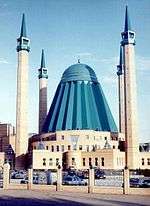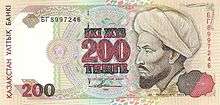Religion in Kazakhstan

The majority of Kazakhstan's citizens are Sunni of the Hanafi school, traditionally including ethnic Kazakhs, who constitute about 63.6% of the population, as well as ethnic Uzbeks, Uighurs, and Tatars.[3][4] Less than 1% are part of the Shafi`i (primarily Chechens) and Shi'a.[4] There are a total of 2,300 mosques,[5] all of them affiliated with the "Spiritual Association of Muslims of Kazakhstan", headed by a supreme mufti.[6] The Eid al-Adha is recognized as a national holiday.[5]
Less than 25% of the population of Kazakhstan is Russian Orthodox, traditionally including ethnic Russians, Ukrainians and Belarusians.[4] Other Christian groups include Roman Catholics, Protestants (Baptists, Presbyterians, Lutherans, Pentecostals, Methodists, Mennonites and Seventh-day Adventists), Jehovah's Witnesses and Mormons.[4] There are a total of 265 registered Orthodox churches, 93 Roman Catholic churches, and 543 Protestant churches and prayer houses.[4] Christmas, rendered in the Russian Orthodox manner according to the Julian calendar, is recognized as a national holiday in Kazakhstan.[5]
Other religious registered groups include Judaism, the Bahá'í Faith, Hinduism, Buddhism, the Church of Scientology, Christian Science, and the Unification Church.[4]
The country is multiethnic, with a long tradition of tolerance and secularism. Since independence, the number of mosques and churches has increased greatly.[4] However, the population is sometimes wary of minority religious groups and groups that proselytize.[4] There were several reports of citizens filing complaints with authorities after their family members became involved with such groups.[4] Leaders of the four religious groups the government considers "traditional" – Islam, Russian Orthodoxy, Roman Catholicism, and Judaism – reported general acceptance and tolerance that other religious groups did not always enjoy.[4]
Religious history
The country has historically hosted a wide variety of ethnic groups with varying religions. Tolerance to other societies has become a part of the Kazakh culture. The foundation of an independent republic, following the disintegration of the USSR, has launched a great deal of changes in every aspect of people's lives. Religiosity of the population, as an essential part of any cultural identity, has undergone dynamic transformations as well.
After decades of suppressed culture, the people were feeling a great need to exhibit their ethnic identity – in part through religion. Quantitative research shows that for the first years after the establishment of the new laws, waiving any restrictions on religious beliefs and proclaiming full freedom of confessions, the country experienced a huge spike in religious activity of its citizens. Hundreds of mosques, synagogues, churches, and other religious structures were built in a matter of years. All represented religions benefited from increased number of members and facilities. Many confessions that were absent before independence made their way into the country, appealing to hundreds of people. The government supported this activity, and has done its best to provide equality among all religious organizations and their followers. In the late 1990s, however, a slight decline in religiosity occurred. The draft religion law being considered in June 2008 has raised international concern over whether there is an intention to meet general standards of freedom of religion and human rights.[7]
Faiths
Islam

Islam is the most commonly practiced religion in Kazakhstan; it was introduced to the region during the 9th century by the Arabs.[8] Traditionally ethnic Kazakhs are Sunni Muslims who mainly follow the Hanafi school.[9] There are few Ahmadi Muslims, who face persecution in the country.[10] Kazakhs including other ethnic groups of Muslim background make up over 90 per cent of all Muslims.[11] The southern region of the country has the highest concentration of self-identified practicing Muslims.
Christianity
Christianity in Kazakhstan is the second most practiced religion after Islam. Most Christian citizens are Russians, and to a lesser extent Ukrainians and Belarusians, who belong to the Russian Orthodox Church. According to a 2009 national census, approximately 26% of the population of Kazakhstan identifies as Christian.[12] 1.5 percent of the population is German, most of whom follow Roman Catholicism or Lutheranism. There are also many Presbyterians, Jehovah's Witnesses, Seventh-day Adventists, and Pentecostals.[9][13] Methodists, Mennonites, and Mormons have also registered churches with the government.[9] According to the 2009 census, there were 4,214,232 Christians in Kazakhstan.[14]
Bahá'í Faith
The Bahá'í Faith in Kazakhstan began during the policy of oppression of religion in the former Soviet Union. Before that time, Kazakhstan, as part of the Russian Empire, would have had indirect contact with the Bahá'í Faith as far back as 1847.[15] Following the entrance of pioneers the community grew to be the largest religious community after Islam and Christianity, though only a few percent of the nation.[16] By 1994 the National Spiritual Assembly of Kazakhstan was elected[17] and the community has begun to multiply its efforts across various interests. The Association of Religion Data Archives (relying on World Christian Encyclopedia) estimated some 6,000 Bahá'ís in 2005.[18]
Judaism

Kazakh Jews have a long history. There are approximately 12,000 to 30,000 Jews in Kazakhstan, less than 1% of the population. Most Kazakh Jews are Ashkenazi and speak Russian.[9][19]
Hinduism
Hindus in Kazakhstan are mainly of the ISKCON sect and by Diaspora Hindus from India. The Indian community in Central Asia, which comprises Kazakhstan, Uzbekistan and Turkmenistan, numbers only 2732 out of a total population of 55.5 million. It consists mainly of NRIs.
Pagan
Freedom of religion and religious tolerance
Kazakhstan has a very diverse and stable religious background. However, some reported occurrences of persecution against Hare Krishnas and Jehovah's Witnesses for proselytizing have raised concern in the international community.[20][21][22]
Article 22 of the Constitution of the Republic of Kazakhstan states that "everyone has the right to a freedom of conscience.” On May 18, 2011, Kazakhstan President adopted a decree establishing the Agency for Religious Affairs. The mission of the Agency is to coordinate interaction between the government, religious groups and civil society in order to ensure religious freedom in Kazakhstan.[23]
References
- ↑ http://www.pewforum.org/2015/04/02/religious-projection-table/2010/percent/all/
- ↑ http://www.globalreligiousfutures.org/countries/kazakhstan#/?affiliations_religion_id=0&affiliations_year=2010®ion_name=All%20Countries&restrictions_year=2013
- ↑ Итоги переписи населения Республики Казахстан 2009 года at the Wayback Machine (archived June 28, 2010). stat.kz. 4 February 2010.
- 1 2 3 4 5 6 7 8 9 10 Kazakhstan – International Religious Freedom Report 2010 U.S. Department of State. Retrieved on 13 January 2011.
- 1 2 3 Religious Situation Review in Kazakhstan Congress of World Religions. Retrieved on 2009-09-07.
- ↑ Islam in Kazakhstan Retrieved on 2009-09-07.
- ↑ Bayram, Mushfig (2008-06-10). "KAZAKHSTAN: Restrictive draft Religion Law to reach full parliament tomorrow". Forum 18. Retrieved 2009-06-05.
- ↑ The Beliefs of the Kazakhstan people
- 1 2 3 4 International Religious Freedom Report 2006 U.S. Embassy in Astana, Kazakhstan
- ↑ "KAZAKHSTAN: Ahmadi Muslim mosque closed, Protestants fined 100 times minimum monthly wage". Forum 18. Retrieved June 6, 2014.
- ↑ Estimation based on Kazakh population share of 67% (Итоги 10 дней с 25 февраля по 6 марта) and 16.3 mln total population according to the preliminary results of the 2009 National Census
- ↑ "The results of the national population census in 2009". Agency of Statistics of the Republic of Kazakhstan. 12 November 2010. Retrieved 13 January 2011.
- ↑ "CIA – The World Factbook – Kazakhstan". The World Factbook. CIA. 2009-05-14. Retrieved 2009-06-05.
- ↑ http://www.stat.kz/p_perepis/Documents/%D0%9D%D0%B0%D1%86%20%D1%81%D0%BE%D1%81%D1%82%D0%B0%D0%B2.rar
- ↑ Momen, Moojan. "Russia". Draft for "A Short Encyclopedia of the Bahá'í Faith". Bahá'í Library Online. Retrieved 2008-04-14.
- ↑ Government of Kazakhstan (2001). "Religious Groups in Kazakhstan". 2001 Census. Embassy of Kazakhstan to the USA & Canada. Retrieved 2008-05-21.
- ↑ The Bahá'í Faith: 1844-1963: Information Statistical and Comparative, Including the Achievements of the Ten Year International Bahá'í Teaching & Consolidation Plan 1953-1963, Compiled by Hands of the Cause Residing in the Holy Land, pages 22 and 46.
- ↑ "Most Baha'i Nations (2005)". QuickLists > Compare Nations > Religions >. The Association of Religion Data Archives. 2005. Retrieved 2009-07-04.
- ↑ Oreck, Alden. "The Virtual Jewish History Tour – Kazakhstan". Jewish Virtual Library. Retrieved 2009-06-05.
- ↑ Corley, Felix (2007-04-03). "KAZAKHSTAN: Officially-inspired intolerance of religious freedom steps up". Forum 18. Retrieved 2009-06-05.
- ↑ Corley, Felix (2006-12-06). "KAZAKHSTAN: More Hare Krishna home demolitions planned?". Forum 18. Retrieved 2009-06-05.
- ↑ Palace of the Soul: Project Updates
- ↑ "Religious Affairs Agency Works to Protect Freedoms, Stop Extremist Ideologies". astanatimes.com.
![]() This article incorporates public domain material from the Library of Congress Country Studies website http://lcweb2.loc.gov/frd/cs/.
This article incorporates public domain material from the Library of Congress Country Studies website http://lcweb2.loc.gov/frd/cs/.

